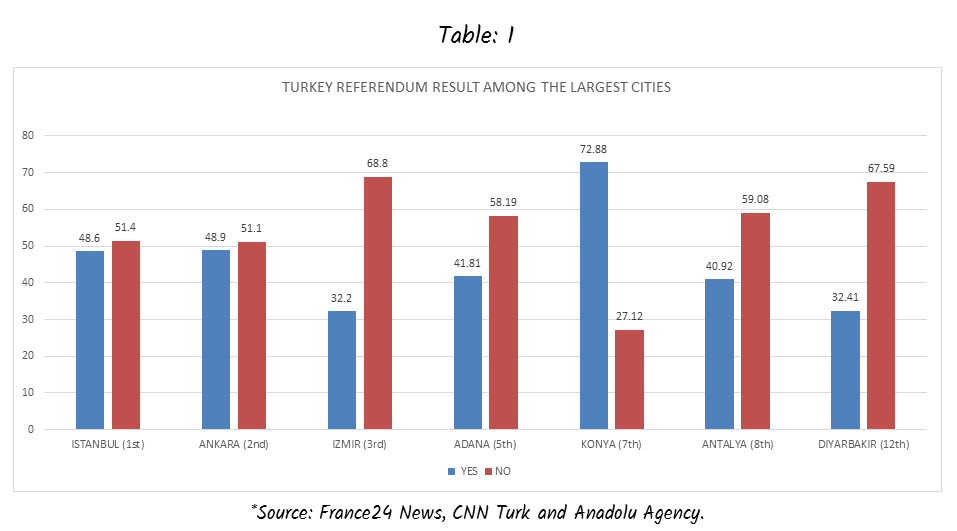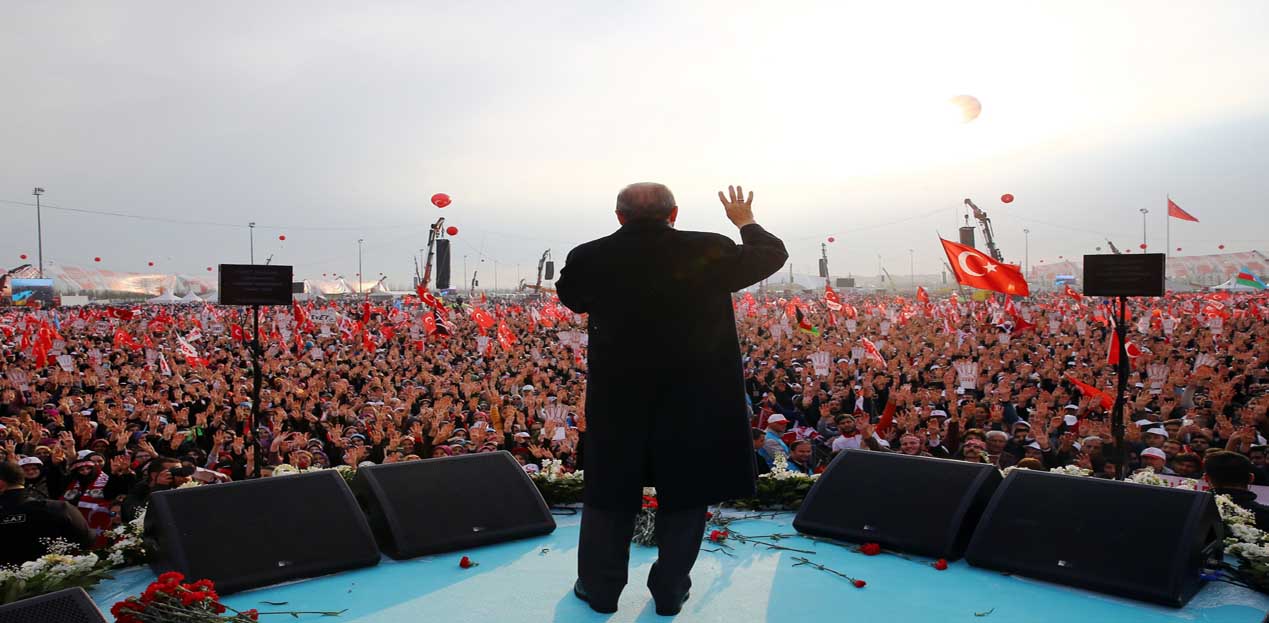On 16 April 2016, the people of Turkey voted on a referendum conducted to make amendments to the Constitution. Aimed to replace a Parliamentary system with a Presidential system, it sought to grant more powers to the President. Since the fail coup attempt last year, Prime Minister Erdogan, has been seeking to consolidate powers in his hands while the state remained under emergency.
With 85 percent voter’s turn out, 51.4 percent voted in favour of the amendment1,2, implying that President Recep Tayyip Erdogan’s push for an Executive Presidency had finally come to fruition. However, with this move, Turkey appears to have gone back in time and reversed its secular ethos. Even though the Turkish Prime Minister Binali Yildirim claims that the “yes” voters were agreeing to the ongoing fight against terrorism3, with Presidential and Parliamentary elections due in 2019, the results point to a divided state in the hands of an authoritarian in the making. Moreover, this amendment points to Turkey’s readiness to give up on its two-decade old bid to join the European Union (EU) to assume a greater role in the region by way of blending in.
The Referendum Proposal
Introduced by Justice and Development Party (AKP) and Nationalist Movement Party (MHP), the referendum contained 18proposals. Some of these proposals dealt with abolishing the post of Prime Minister, thereby granting more powers to the President. This is especially problematic since Erdogan has been wielding more powers, being the de facto leader of the country, without Constitutional guarantees, since 2014; second, the system will allow the President to issue decrees, appoint judges, and other officials. This means that the President will have his say in appointments made to those who will in turn be scrutinising decisions made by him. This system would disrupt the checks and balances; third, the referendum allows the President to contest elections for two five years term. It also grants the President an option to run for a third term in case the Parliament calls in for an early election; and fourth, it also allows the President to conduct an inquiry on civil servants.
There are various risks associated with a Presidential form of democracy. According to political scientist, Juan Linz, a Presidential form of government runs the risk of making the political process rather rigid4. The power distribution structure between the executive and the legislative branch in a Presidential structure is also unyielding. Since the foundation of the republic, Turkey has had three different constitutions, four military interventions, and sixty governments in 80 years. The debate on the shift from Parliamentary to Presidential form of governance in Turkey has been going on for a long time. The difficulties with the Turkish governance structure began with the 1961 Constitution, brought in after the 1960 coup, wherein it was decided to weaken the position of the Prime Minister by giving more powers to the President. However, there have always been reservations against the shift. Some have argued that this will create an authoritarian or even dictatorial executive thereby reversing back to the Ottoman history of ‘singlemanship’ and lack of democratic culture5.
A Divided State
Domestically, the close difference in the “yes” and “no” votes, though disputed, points to a deeply divided Turkish society. While Erdogan is rejoicing on the 51.4 percent “yes” votes, oppositions parties such as Republican People’s Party’s (CHP) deputy has accused these elections of “violations” involving one and half million unstamped ballot papers. The pro-Kurdish party, People’s Democratic Party (HDP), has said that the results cannot be taken as legitimate till appeal was finalised. The ultranationalist party, Nationalist Movement Party (MHP), was internally divided between proponents and accepters of “yes” campaign like Devlet Bahceli and Meral Aksener, an expelled rebel member who became the “no” campaigner.
The results from the largest cities (shown in Table 1) reveal the voting pattern based on the socio-economic divide in the country. The top three cities, which houses the largest number of urban, education, high to middle income group population, voted against the referendum. Likewise, the cities in the East Thrace region, closest to Europe, lying in the North Western region, Kirklareli (70.33 percent) and Edirne (70.49 percent), voted against the referendum in large numbers. However, the eastern cities, Bayburt (81.7 percent), Rize (75.55 percent), Gunushane (75.16 percent), Erzurum (74.49 percent), were among the top cities voting in favour of the referendum. The Anatolia region remained divided with Central Anatolian city, Aksaray (75.49 percent), voting in affirmation and Eastern Anatolia city, Tunceli (80.41 percent), recording the highest number of “no” votes among all other cities.
What is striking is not just the divided internal votes but also that of the Turkish diaspora in Europe and US. Despite the on-going efforts towards securing EU membership, the majority of the Turkish diaspora in Europe voted in favour of the referendum thereby marring its chances further. While German Chancellor, Angela Merkel issued a joint statement with Foreign Minister Sigmar Gabriel, stating that the referendum result shows how “deeply divided” 6 Turkish society, Turkish diaspora in Germany voted in favour of the move with 63 percent. It is also important to mention that Germany houses the largest Turkish diaspora. Likewise, Netherlands with 71 percent and France with 64 percent voted in affirmation. On the other hand, the diaspora in the United States voted overwhelmingly against the referendum (83 percent voting for “no”). It is important to note that recently US relation, under Trump administration, with Turkey are looking upwards. US President Trump congratulated Erdogan on the success of the referendum7. Erdogan also made a statement that relations with US under Trump administration will be better than Obama administration, who cheated Turkey on PKK (Kurdish Worker’s Party). Thus, these convergences and divergences point to an uncertain future for the Turkish state and society.
Even though the AKP was expecting 55 percent votes in favour of the referendum, the narrow win will make them vulnerable to challenges posed by the civil society and the opposition in policy implementation.

Authoritarian in the Making?
International observers have called the referendum “unleveled playing field”. Concerns of this kind have aroused due to the conduct of referendum being undertaken during a state of emergency after the failed military coup attempt last year by the supporters of Fethullah Gulen, a US based cleric living in exile. Soon thereafter, Erdogan moved to undertaking counter coup measures. These included the purging of defectors from the civil services, police, teachers, journalists and so on, thereby tightening his control and securing a mass base of supporters.
Again, the state of emergency also curtailed some of the rights and provided impartial information. So, while the 18 proposals were lucidly stated in the referendum, they were not listed in the ballot. The only two options listed on the referendum sheet were “yes” and “no”, thereby limiting the options available. Besides, the Organization for Security and Co-operation in Europe (OSCE) came out with a report stating that the framework of the campaign was ‘restrictive’ and ‘imbalanced’ due to the active involvement of the President, leading national officials, and local public officials in the “yes” campaign8. The report also noted that there were efforts made by several political parties and civil society organisations to obstruct the “no” supporters, including the misuse of administrative resources. The organisation also criticised many senior officials for tarnishing the campaign rhetoric and equating “no” supporters with terrorist sympathisers.
Conclusion
Considering Turkey has now voted in favour of a Presidential form of government, albeit narrowly, and looking at the previous trends with Erdogan accumulating more powers in his hands, point to and inversely proportional effect on Turkey’s bid for EU membership.
The realities, as enunciated in the OSCE report, suggest increased rigging in elections that is characteristic of the states in the West Asian region. Given that, one can only deduce that Turkey is willing to give up on its two decade long EU aspiration in exchange for greater regional clout. Clearly, Erdogan and AKP believes its time has come to identify itself more as part of the “Middle Eastern” identity than wasting its time and energy over gaining an European identity.
Endnotes
1. The opposition parties have argued that the results were contested.
2. ‘Turkey referendum: Vote expanding Erdogan powers 'valid' ‘, BBC, Europe, April 17, 2017 at URL: http://www.bbc.com/news/world-europe-39618614.
3. Burcu Arik, ‘Referendum said 'Yes' to fighting terror: Turkish PM ‘, Anadolu Agency, Ankara, April 19, 2017 at URL: http://aa.com.tr/en/politics/referendum-said-yes-to-fighting-terror-turkish-pm/800597.
4. Linz, Juan J, “The Perils of Presidentialism”, Journal of Democracy, Vol 1, No.1 Winter 1990, pp 51 – 69.
5. Recep Turk, ‘Feasibility of Presidential System in Turkey’, Turkish Journal of Politics, Vol 2, No1, Summer 2011. URL: http://citeseerx.ist.psu.edu/viewdoc/download?doi=10.1.1.475.2176&rep=rep1&type=pdf#page=35.
6. Michelle Martin, ‘European leaders say vote shows 'deeply divided' Turkey’, Reuters, Berlin, April 17, 2017 at URL: http://www.reuters.com/article/us-turkey-referendum-germany-idUSKBN17J0KU.
7. Lauren Gambino, ‘Trump congratulates Erdoğan after Turkey vote grants sweeping powers ‘, The Guardian, Washington, April 18, 2-17 at URL: https://www.theguardian.com/us-news/2017/apr/17/donald-trump-erdogan-turkey-referendum-congratulations.
8. “International Referendum Observation Mission
Republic of Turkey – Constitutional Referendum, 16 April 2017” at http://www.osce.org/odihr/elections/turkey/311721?download=true (Accessed on April 22, 2017).
Image Source: http://www.sbs.com.au











Post new comment